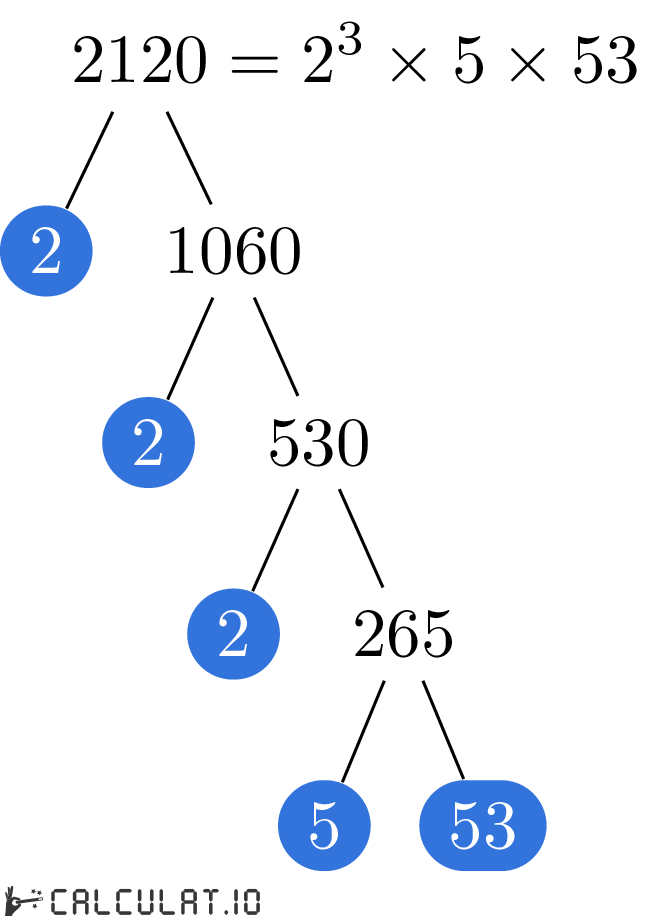Prime Factorization of 2120
What is the Prime Factorization of 2120?
or
Explanation of number 2120 Prime Factorization
Prime Factorization of 2120 it is expressing 2120 as the product of prime factors. In other words it is finding which prime numbers should be multiplied together to make 2120.
Since number 2120 is a Composite number (not Prime) we can do its Prime Factorization.
To get a list of all Prime Factors of 2120, we have to iteratively divide 2120 by the smallest prime number possible until the result equals 1.
Here is the complete solution of finding Prime Factors of 2120:
The smallest Prime Number which can divide 2120 without a remainder is 2. So the first calculation step would look like:
2120 ÷ 2 = 1060
Now we repeat this action until the result equals 1:
1060 ÷ 2 = 530
530 ÷ 2 = 265
265 ÷ 5 = 53
53 ÷ 53 = 1
Now we have all the Prime Factors for number 2120. It is: 2, 2, 2, 5, 53
Or you may also write it in exponential form: 23 × 5 × 53
Related Calculations
See Also
- Factors of a Number - List all Factors and Factor Pairs of a Number
- Is number a Prime - Find out whether a given number is Prime or not
- Prime Numbers List - List of all Prime Numbers - how many Prime numbers are between

Prime Factorization Table
| Number | Prime Factors |
|---|---|
| 2105 | 5, 421 |
| 2106 | 2 × 34 × 13 |
| 2107 | 72 × 43 |
| 2108 | 22 × 17 × 31 |
| 2109 | 3, 19, 37 |
| 2110 | 2, 5, 211 |
| 2111 | 2111 |
| 2112 | 26 × 3 × 11 |
| 2113 | 2113 |
| 2114 | 2, 7, 151 |
| 2115 | 32 × 5 × 47 |
| 2116 | 22 × 232 |
| 2117 | 29, 73 |
| 2118 | 2, 3, 353 |
| 2119 | 13, 163 |
| 2120 | 23 × 5 × 53 |
| 2121 | 3, 7, 101 |
| 2122 | 2, 1061 |
| 2123 | 11, 193 |
| 2124 | 22 × 32 × 59 |
| 2125 | 53 × 17 |
| 2126 | 2, 1063 |
| 2127 | 3, 709 |
| 2128 | 24 × 7 × 19 |
| 2129 | 2129 |
| 2130 | 2, 3, 5, 71 |
| 2131 | 2131 |
| 2132 | 22 × 13 × 41 |
| 2133 | 33 × 79 |
| 2134 | 2, 11, 97 |
About "Prime Factorization" Calculator
Prime factors are the positive integers having only two factors - 1 and the number itself
